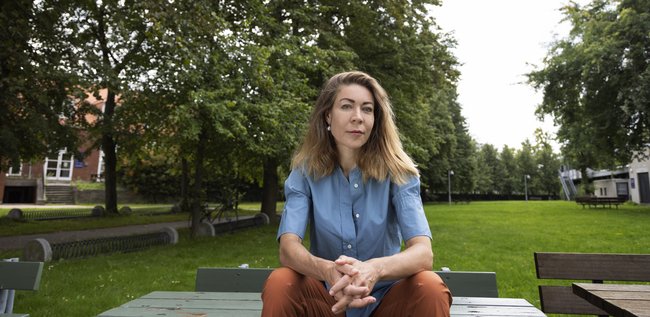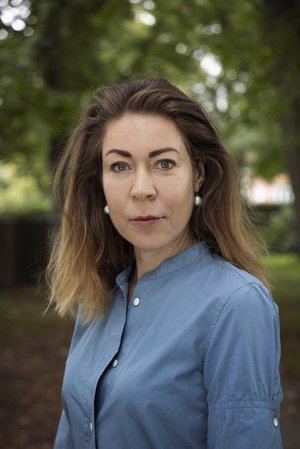Distinguished alumna 2023: Lone Frank

Journalist with the heart of a researcher
Science journalist and author Lone Frank, has an obvious advantage when writing about research, because she knows research in and out: she has a PhD in neurobiology. In fact the driving force for the 2023 distinguished alumna is the same as for a researcher; namely to explain how the world works.
Before our interview, Lone Frank had already been on the morning radio news programme P1 Morgen to talk about how young people sometimes struggle with life and about the concerns of experts regarding over-diagnosis. The radio feature was based on Lone Frank's article published on the same morning in the Danish newspaper Weekendavisen on psychiatry and 'runaway diagnoses'. But wait a minute, why use Lone Frank, a journalist, as an expert? She’s a communicator: not a psychiatrist.
A few hours later, in the editorial office in Pilestræde in central Copenhagen, she chuckles at my question.
"One of the joys of my job, and indeed my ambition, is to open the door to a closed world and explain things so that others can understand what they’re all about. Other journalists seem to recognise this when they call and ask me to explain something," says Lone Frank about the morning's health and psychiatry feature. These are two topics she often returns to in her work as a journalist at Weekendavisen, as a podcast host and in her writing.
Lone Frank has a reputation in the media sector for being able to use her research background to make knowledge understandable and useful without falling into the trap of arrogance, as many experts do.
When I ask about this, she replies that her university background is her greatest advantage when she has to communicate complex knowledge.
"I've been asked if I wasn't completely out of my mind when I decided to take a PhD degree and then become a journalist. But to me it’s very straightforward. My researcher training is amazingly useful when I not only have to describe an issue, but also analyse what’s going on in the research world. It's like asking whether you need to know something about economics when you write a financial article. Of course you do. It’s always good to know something about the substance of what you’re reporting. In fact, I think we should have more professional communicators with a research background," says Lone Frank.
From research to journalism
Lone Frank studied biology at Aarhus University in the early 1990s, and she was fascinated by the brain and behavioural biology. She also chose these as her thesis topic – and wrote it at the Department of Neuropathology at the University of Copenhagen. But she missed Aarhus University terribly.
"Far from Aarhus, I discovered that Aarhus University campus, student life and the teaching staff had been very good for me. I simply felt more at home at AU, even though I had to go to UCPH to get the specific scientific training I needed," says Lone Frank, who went on to take a PhD at the University of Southern Denmark after completing her Master's.
But Lone Frank did not feel at home in the research world. At least not as a practising researcher. Instead, as a newly qualified PhD, she took a job at a patent agency, and as a sideline she wrote research news articles, which she got published in the newspaper Jyllands-Posten, among other places.
"At that time, research communication was not that big in Danish journalism, as it was in the US. So my freelance career was rather modest at first," says Lone Frank.
Anchored in the personal
However, as time passed, public interest in science journalism became stronger, and the media devoted increasing space to articles about new research findings, scientific debate or academic controversies. Weekendavisen was no exception, and Lone was offered a temporary job to cover for a journalist on maternity leave. This led to yet another temporary position. By the end of the second period, Lone had firmly established herself as a science journalist.
She is now in her 25th year at Weekendavisen, where she writes week after week about health, medicine, technology and ethics. Including psychiatry.
"Mental illness and the human brain have always interested me. I’m fascinated by how we are shaped," she says. Lone Frank has experienced mental illness at close hand in her family, and she herself has suffered from depression.
She brings this experience into her journalism. For example, in her podcast series Lone Frank and the ten thousand souls, about the world's largest collection of human brains, which until just a few years ago was stored in the basement of the psychiatric hospital (now closed) in the Risskov suburb of Aarhus. Lone was struck by depression just before she was due to start recording the podcast. Instead of abandoning the project, she decided to use the series to explore whether she could learn more about her own condition from the collection of brains.
When I ask Lone whether you can share too much of yourself in such a podcast, she replies:
"I often use myself and my own story in my journalism and writing. It comes very naturally to me." She laughs, adding:
"One of my great strengths is that I know what I'm writing about when I write about things like psychiatry or love. Then I put it into perspective, and I find relevant researchers to help with answers and to unfold the story. In this way, my approach to my work is similar to a researcher's. I develop a thesis and then get it confirmed or disproved. But it's not about anything private. If that were so, I could go to a glossy magazine. It's first and foremost about an issue I want to explore, and so I can use myself as a case. An anchor in the personal is always good."
Knowledge doesn’t always trump opinion
In 2000, Lone Frank wrote about a lack of dialogue between science and the rest of the world. Since then, she has seen a quantum leap in communication:
"For the current generation of researchers, coming forward and communicating their work is simply a matter of course. And they really want to do so. Knowledge is gushing out of the research world. We’ve never had so many channels for communication, and the media has become much better at science journalism," says Lone, before asking rhetorically:
"So why on earth is the debate still marked by so much ignorance? How can so many be against vaccines; why do so many doubt climate change or have so many opinions about how to combat climate change? The reason is that it's not just about knowledge. You can pump out as much knowledge as you like, but that won’t always change people's opinions."
Lone Frank’s approach to science journalism is first to look at things objectively and then analyse her way to where the evidence is pointing.
"If there’s a debate, I’m not just going give equal space to both sides of the argument if one side is clearly on the right track. My role is rather to uncover what is the most truthful."
Lone believes that universities have a definite interest in contributing facts to public debate:
"Universities, and what they can do for society, become very visible when researchers are in the media. Not just when they communicate their discoveries, but also when they’re asked to comment on current events," says Lone Frank, who also urges researchers to take matters in their own hands and not just wait until they receive a call from journalists.
"If there are researchers out there scratching their heads in dismay because they hear or see something they think is clearly nonsense, they should get involved with their knowledge. Or else the train will leave without them. They must be bold and interfere. But always with an understanding of why some readers may resist the facts. It's a lot to do with emotions."
Not looking for praise
Lone Frank is driven by same force shared by journalists and researchers: How does the world work?
"The only difference is in our approach to the issues we deal with. My research dealt specifically with rat brains. Now, as a journalist, my work is about looking into how research influences the way we see things. Take mental illness, for example. It’s interesting to look behind the numbers. When do we ourselves think that we are sick or healthy? There's always something to wonder about."
Does Lone Frank ever regret leaving academia? After all the she could have found the answers herself?
"NO! I talk to researchers all the time, and that confirms I made the right decision. I’d have torn my hair out a long time ago with the daily frustrations of having to apply for funding, administer projects and struggle to publish. Now I choose big or small issues myself for my articles, books, or podcasts. That suits me infinitely better."
Lone Frank is also convinced that her decision to pursue a career in journalism isn’t a great loss for academia:
"I'm happy to leave it to others to make discoveries and produce results. As long as I’m allowed to analyse the significance of the results for the world around us."
